Punjab State Board PSEB 12th Class Maths Book Solutions Chapter 7 Integrals Ex 7.9 Textbook Exercise Questions and Answers.
PSEB Solutions for Class 12 Maths Chapter 7 Integrals Ex 7.9
Direction (1 – 20): Evaluate the definite integrals.
Question 1.
\(\int_{-1}^{1}\) (x + 1) dx
Solution.
Let I = \(\int_{-1}^{1}\) (x + 1) dx
∫ (x + 1) dx = \(\frac{x^{2}}{2}\) + x = F(x)
By second fundamental theorem of calculus, we get
I = F(1) – F(- 1)
= \(\left(\frac{1}{2}+1\right)-\left(\frac{1}{2}-1\right)\)
= \(\frac{1}{2}\) + 1 – \(\frac{1}{2}\) + 1 = 2.
![]()
Question 2.
\(\int_{2}^{3} \frac{1}{x}\) dx
Solution.
Let I = \(\int_{2}^{3} \frac{1}{x}\) dx
∫ \(\frac{1}{x}\) dx = log |x| = F(x)
By second fundamental theorem of calculus, we get
I = F(3) – F(2)
= log |3| – log |2| [∵ log(a) – log(b) = log (\(\frac{a}{b}\))]
= log \(\frac{3}{2}\)
Question 3.
\(\int_{1}^{2}\) (4x3 + 5x2 + 6x + 9) dx
Solution.
Let I = \(\int_{1}^{2}\) (4x3 + 5x2 + 6x + 9) dx
∫ (4x3 + 5x2 + 6x + 9) dx = \(4\left(\frac{x^{4}}{4}\right)-5\left(\frac{x^{3}}{3}\right)+6\left(\frac{x^{2}}{2}\right)\) + 9(x)
= x4 – \(\frac{5 x^{3}}{3}\) + 3x2 + 9x = F(x)
By second fundamental theorem of calculus, we get
I = F(2) – F(1)
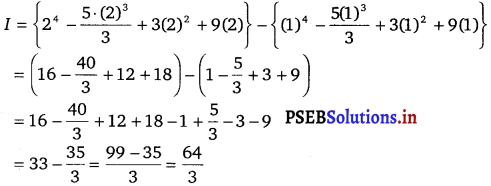
![]()
Question 4.
\(\int_{0}^{\frac{\pi}{4}}\) sin 2x dx
Solution.
Let I = \(\int_{0}^{\frac{\pi}{4}}\) sin 2x dx
∫ sin 2x dx = \(\left(\frac{-\cos 2 x}{2}\right)\) = F(x)
By second fundamental theorem of calculus, we get
I = F(\(\frac{\pi}{4}\)) – F(0)
= \(\frac{1}{2}\left[\cos 2\left(\frac{\pi}{4}\right)-\cos 0\right]\)
= – \(\frac{1}{2}\) [0 – 1]
= \(\frac{1}{2}\)
Question 5.
\(\int_{0}^{\frac{\pi}{2}}\) cos 2x dx
Solution.
Let I = \(\int_{0}^{\frac{\pi}{2}}\) cos 2x dx
∫ cos 2x = \(\left(\frac{\sin 2 x}{2}\right)\) = F(x)
By second fundamental theorem of calculus, we get
I = F(\(\frac{\pi}{4}\)) – F(0)
= \(\frac{1}{2}\) [sin 2(\(\frac{\pi}{2}\)) – sin 0]
= \(\frac{1}{2}\) [sin π – sin 0]
= \(\frac{1}{2}\) [0 – 0] = 0.
![]()
Question 6.
\(\int_{4}^{5}\) ex dx
Solution.
Let I = \(\int_{4}^{5}\) ex dx
∫ ex dx = ex = F(x)
By second fundamental theorem of calculus, we get
I = F(5) – F(4)
= e5 – e4
= e4 (e – 1)
Question 7.
\(\int_{0}^{\frac{\pi}{4}}\) tan x dx
Sol.
Let I = \(\int_{0}^{\frac{\pi}{4}}\) tan x dx
∫ tan x dx = – log |cos x| =F(x)
By second fundamental theorem of calculus, we get
I = F(\(\frac{\pi}{4}\)) – F(0)
= – log |cos \(\frac{\pi}{4}\)| + log |cos 0|
= – log |\(\frac{1}{\sqrt{2}}\)| + log |1|
= – log \((2)^{-\frac{1}{2}}\)
= \(\frac{1}{2}\) log 2.
![]()
Question 8.
\(\int_{\frac{\pi}{6}}^{\frac{\pi}{4}}\) cosec x dx
Solution.
21et I = \(\int_{\frac{\pi}{6}}^{\frac{\pi}{4}}\) cosec x dx
∫ cosec x dx = log cosec x – cot x = F(x)
By second fundamental theorem of calculus, we get
I = F(\(\frac{\pi}{4}\)) – F(\(\frac{\pi}{6}\))
= log |cosec \(\frac{\pi}{4}\) – cot \(\frac{\pi}{4}\)| – log |cosec \(\frac{\pi}{6}\) – cot \(\frac{\pi}{6}\)|
= log |√2 – 1| – log |2 – √3|
= log \(\left(\frac{\sqrt{2}-1}{2-\sqrt{3}}\right)\)
Question 9.
\(\int_{0}^{1} \frac{d x}{\sqrt{1-x^{2}}}\)
Solution.
Let I = \(\int_{0}^{1} \frac{d x}{\sqrt{1-x^{2}}}\)
⇒ ∫ \(\frac{d x}{\sqrt{1-x^{2}}}\) = sin-1 x = F(x)
By second fundamental theorem of calculus, we get
I = F(1) – F(0)
= sin-1 (1) – sin-1 (0)
= \(\frac{\pi}{2}\) – 0 = \(\frac{\pi}{2}\)
![]()
Question 10.
\(\int_{0}^{1} \frac{d x}{1+x^{2}}\)
Solution.
Let I = \(\int_{0}^{1} \frac{d x}{1+x^{2}}\)
∫ \(\frac{d x}{1+x^{2}}\) = tan-1 x = F(x)
By second fundamental theorem of calculus, we get
I = F(1) – F(0)
= tan-1 (1) – tan-1 (0) = \(\frac{\pi}{4}\)
Question 11.
\(\int_{2}^{3} \frac{d x}{x^{2}-1}\)
Solution.
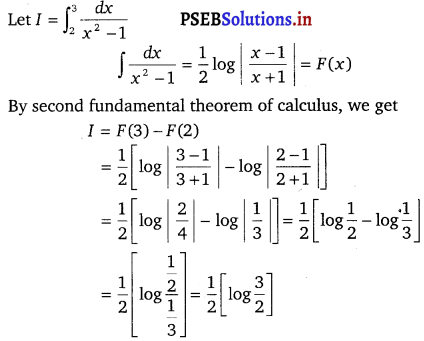
Question 12.
\(\cdot \int_{0}^{\frac{\pi}{2}}\) cos2 x dx
Solution.
Let I = \(\cdot \int_{0}^{\frac{\pi}{2}}\) cos2 x dx
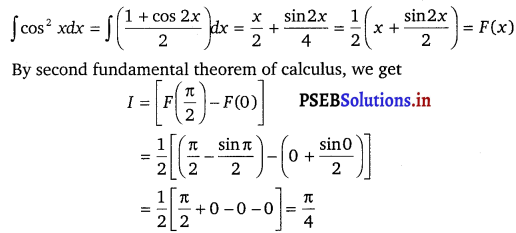
![]()
Question 13.
\(\int_{2}^{3} \frac{x d x}{x^{2}+1}\)
Solution.
Let I = \(\int_{2}^{3} \frac{x d x}{x^{2}+1}\)
= \(\frac{1}{2}\) log (1 + x2) = F(x)
By second fundamental theorem of calculus, we get
I = F(3) – F(2)
= \(\frac{1}{2}\) [log(1 +(3)2) – log(1 + (2)2)]
= \(\frac{1}{2}\) [log(10) – log(5)]
= \(\frac{1}{2}\) log (\(\frac{10}{5}\))
= \(\frac{1}{2}\) log 2
Question 14.
\(\int_{0}^{1} \frac{2 x+3}{5 x^{2}+1}\) dx
Solution.
Let I = \(\int_{0}^{1} \frac{2 x+3}{5 x^{2}+1}\) dx
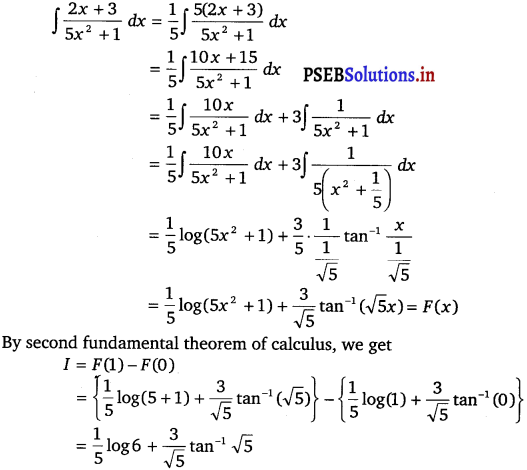
![]()
Question 15.
\(\int_{0}^{1}\) x ex2 dx
Solution.
Let I = \(\int_{0}^{1}\) x ex2 dx
put x2 = t
⇒ 2x dx = dt
As x → 0, t → 0 and as x → 1, t → 1
I = \(\frac{1}{2}\) \(\int_{0}^{1}\) et dt
⇒ \(\frac{1}{2}\) ∫ et dt = \(\frac{1}{2}\) et = F(t)
By second fundamental theorem of calculus, we get
I = F(1) – F(0)
= \(\frac{1}{2}\) e – \(\frac{1}{2}\) e0
= \(\frac{1}{2}\) (e – 1)
Question 16.
\(\int_{1}^{2} \frac{5 x^{2}}{x^{2}+4 x+3}\) dx
Solution.
Let I = \(\int_{1}^{2} \frac{5 x^{2}}{x^{2}+4 x+3}\) dx
Dividing 5x2 by x2 + 4x + 3, we get
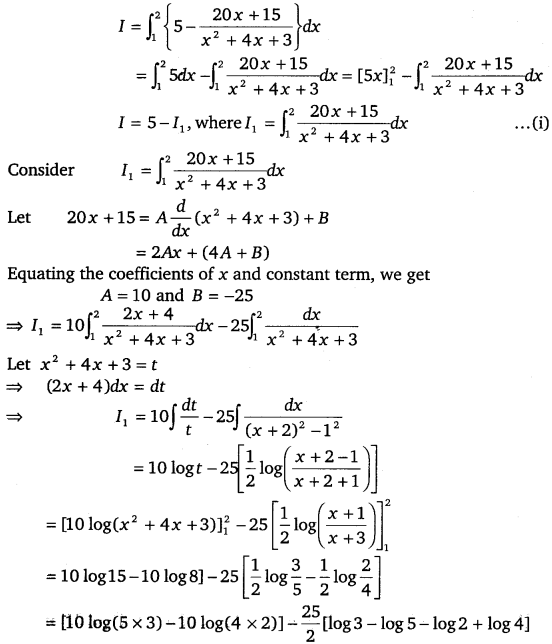
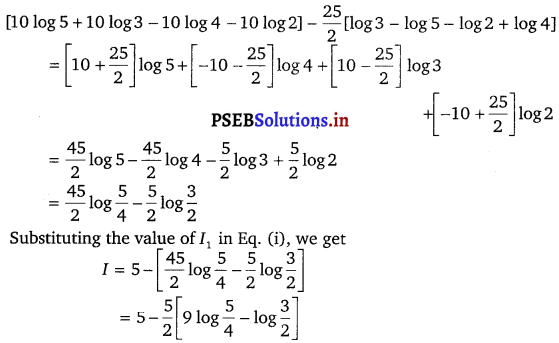
![]()
Question 17.
\(\int_{0}^{\frac{\pi}{4}}\) (2 sec2 x + x3 + 2) dx
Solution.
Let I = \(\int_{0}^{\frac{\pi}{4}}\) (2 sec2 x + x3 + 2) dx
∫ (2 sec2 x + x3 + 2) dx = 2 tan x + \(\frac{x^{4}}{4}\) + 2x
By second fundamental theorem of calculus, we get
I = F(\(\frac{\pi}{4}\)) – F(0)
= \(\left\{\left(2 \tan \frac{\pi}{4}+\frac{1}{4}\left(\frac{\pi}{4}\right)^{4}+2\left(\frac{\pi}{4}\right)\right)\right\}\) – (2 tan 0 + 0 + 0)
= \(2 \tan \frac{\pi}{4}+\frac{\pi^{4}}{4^{5}}+\frac{\pi}{2}=2+\frac{\pi}{2}+\frac{\pi^{4}}{1024}\)
Question 18.
\(\int_{0}^{\pi}\) (sin2 \(\frac{x}{2}\) – cos2 \(\frac{x}{2}\)) dx
Solution.
Let I = \(\int_{0}^{\pi}\) (sin2 \(\frac{x}{2}\) – cos2 \(\frac{x}{2}\)) dx
= – \(\int_{0}^{\pi}\) (cos2 \(\frac{x}{2}\) – sin2 \(\frac{x}{2}\)) dx
= – \(\int_{0}^{\pi}\) cos x dx
∫ cos dx = sin x = F(x)
By second fundamental theorem of calculus, we get
I = F(π) – F(0)
= sin π – sin 0 = 0.
![]()
Question 19.
\(\int_{0}^{2} \frac{6 x+3}{x^{2}+4}\) dx
Solution.
Let I = \(\int_{0}^{2} \frac{6 x+3}{x^{2}+4}\) dx
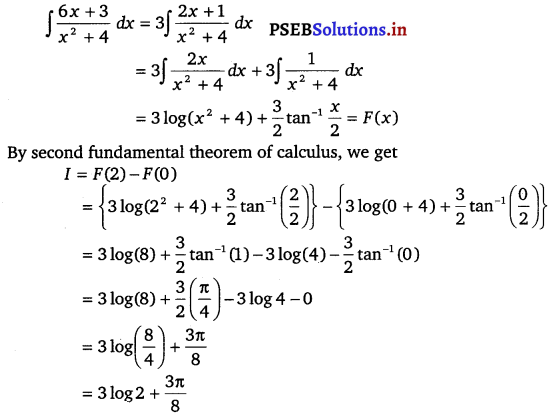
Question 20.
\(\int_{0}^{1}\) (xex + sin \(\frac{\pi x}{4}\)) dx
Solution.
Let I = \(\int_{0}^{1}\) (xex + sin \(\frac{\pi x}{4}\)) dx
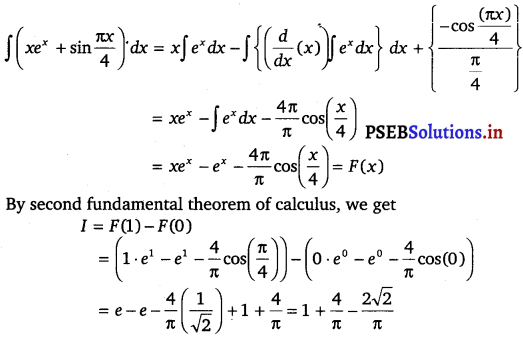
![]()
Question 21.
\(\int_{1}^{\sqrt{3}} \frac{d x}{1+x^{2}}\) equals
(A) \(\frac{\pi}{3}\)
(B) \(\frac{2 \pi}{3}\)
(C) \(\frac{\pi}{6}\)
(D) \(\frac{\pi}{12}\)
Solution.
Let I = \(\int_{1}^{\sqrt{3}} \frac{d x}{1+x^{2}}\)
= tan-1 x = F(x)
By second fundamental theorem of calculus, we get
\(\int_{1}^{\sqrt{3}} \frac{d x}{1+x^{2}}\) = F(√3) – F(1)
= tan-1 (√3) – tan-1 (1)
= \(\frac{\pi}{3}-\frac{\pi}{4}=\frac{\pi}{12}\)
Hence, the correct answer is (D).
![]()
Question 22.
\(\int_{0}^{\frac{2}{3}} \frac{d x}{4+9 x^{2}}\) equals
(A) \(\frac{\pi}{6}\)
(B) \(\frac{\pi}{12}\)
(C) \(\frac{\pi}{24}\)
(D) \(\frac{\pi}{4}\)
Solution.
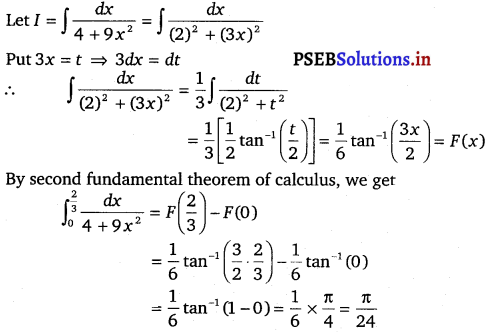
Hence, the correct answer is (C).
